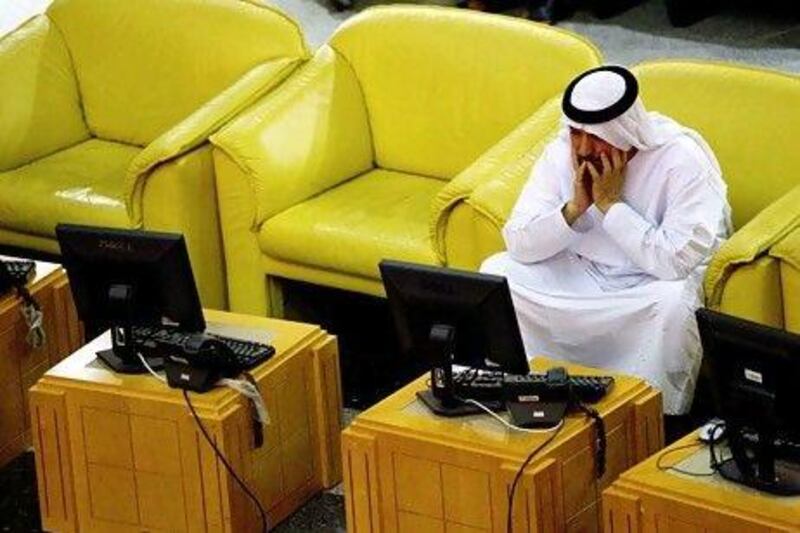Middle East stock markets are poised to attract billions of dollars of funding as equity investors scour the globe for companies paying high dividends, a report from Deutsche Bank said.
As a result of falling yields on stocks and bonds in developed and emerging markets alike, exchanges that had looked unattractive because of poor liquidity or high levels of political or legal risk are now being seen in a new light by fund managers using dividend strategies.
"These strategies have seen over US$40 billion [Dh146.92bn] of net inflows over the past year, despite an outflow of an equal magnitude from equity funds in general," the report said. "The superior yields should persist and those investors seeking income could find the Mena [Middle East and North Africa] region rewarding."
As the Emirates makes a steady recovery from the global financial crisis, the coffers of UAE banks and property developers have filled with extra cash.
Companies have been put under pressure to reward investors who have suffered from plunging share prices in the past few years. Big dividend payouts at some companies in the Emirates have prompted shareholder revolts at other companies that have failed to match them.
Despite the strong fundamentals, so far this year investment in Middle East stocks has lagged global emerging markets.
For the year to date, $122 million of overseas funding has been invested in Dubai's listed equities, compared to $92m for Abu Dhabi, according to monthly aggregates of equity fund inflows from Deutsche Bank. Saudi Arabia has generated $124m in inflows.
Abu Dhabi stocks have proven particularly popular recently, with net inflows registered during each of the past six months.
Earlier this year, a Dh1.5bn dividend from First Gulf Bank prompted a shareholder request at National Bank of Abu Dhabi for a higher payout.
Despite the higher dividends on offer, the Middle East has experienced net outflows this year, driven single-handedly by an investor retreat from Qatar during the past 13 months.
Several big deals have taken place in the region this year, including France Telecom's acquisition of a 94 per cent stake in Egypt's Mobinil in May for 20.2bn Egyptian pounds (Dh12.18bn), and Qatar Telecom's $1.8bn takeover of 92 per cent of Kuwait's Wataniya.
In the UAE, Qatar National Bank boosted its stake in Commercial Bank International, an Abu Dhabi-listed bank, from 16.5 per cent to 39.9 per cent, while Blakeney Management, a London-based investment boutique, acquired a 5.3 per cent stake in Depa, the Nasdaq Dubai-listed interior design company.
Announcements of bond-buying programmes from the United States Federal Reserve, the European Central Bank and the Bank of Japan have flattened yields on western government debt to near-zero or even negative rates.
The result has been that investors have made increasingly risky market bets, first rushing into investment grade corporate credit in an effort to maintain returns, and then junk bonds. Bond yields move in the opposite direction from demand.
Signs were starting to emerge of a "bubble" in bond markets, which could convince investors back into riskier equities, said Gary Dugan, the chief investment officer for Asia and Middle East at Coutts.
Investors "still need a bit of convincing" to return to equities after the wrenching declines of the global financial crisis, Mr Dugan added.
So far this year, the Dubai Financial Market has advanced more than 22 per cent this year briefly breaking twice into bull markets - described as a rise of 20 per cent or more during any given period. A rise in Emaar Properties' shares has accounted for almost half of the gains during the year to date.
The Abu Dhabi Securities Exchange has gained more than 10 per cent over the same period.
Despite the recent surge in inflows, Arabian Gulf markets accounted for an insignificant portion of global emerging market investment, said Alia Moubayed, the regional director of research at Barclays Bank.
Hot money flows were "really very very thin compared to the global inflows you're seeing into emerging markets," she said. (Hot money is a term to describe speculative inflows into a country. Because these inflows tend to be withdrawn at the first sign of trouble, they are viewed as less sustainable than longer term investments.)
Net inflows into global emerging market equities totalled $384.77bn during the past week alone, according to data compiled by EPFR Global.
The UAE's exchanges remain hobbled by low levels of trading activity, which have forced large numbers of brokerages out of business, while global investment banks including Nomura, HSBC, Credit Suisse have downsized or relocated research desks and stock trading operations.
But the resulting scarcity of analysts meant that many regional companies were now not properly rated and therefore undervalued, said Ghadir Abu Leil-Cooper, head of equities for Europe, the Middle East and Asia at Baring Asset Management.





